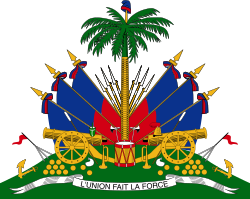History
The land that would become Haiti was first colonized by Spain at the end of the 15th century. The Spanish essentially wiped out the native Taíno people through slavery and smallpox, to which the Taíno had no immunity. An early defender of more humane treatment of the Taíno was the Spanish priest Bartolomé de Las Casas. Albeit too late to save the Taíno, Las Casas was able to persuade the Spanish government that the Taíno could not withstand such cruel treatment. This had the tragic side effect of the importation of African slaves to replace the labor of the diminishing Taíno.
Initially, Las Casas believed Africans to be suitable for slavery, but he later came to oppose their enslavement too. "I soon repented and judged myself guilty of ignorance. I came to realize that black slavery was as unjust as Indian slavery...and I was not sure that my ignorance and good faith would secure me in the eyes of God," Las Casas wrote in The History of the Indies in 1527. [2]
In 1697, Spain formally ceded to France control of the part of the island of Hispaniola that would become Haiti, naming it Saint-Domingue. Slavery in Saint-Domingue, France's most lucrative colony, was known to be especially brutal, with a complete turnover of the slave population due to death every 20 years. [3] According to the historian Laurent Dubois, between 5 and 10 percent of slaves died every year due to overwork and disease, a rate that outpaced births. The dead were replaced by new slaves from Africa. [4]
In 1791, what would become known as the Haitian Revolution began. Predominantly a slave revolt, Haitians finally won their freedom and independence from France in 1804.
In 1825, France's King Charles X threatened to invade Haiti unless it paid an "independence debt" of 150 million francs to reimburse France for the loss of its slaves and land. The debt was later reduced to 90 million francs but it was not until 1947 that Haiti had paid off what many have regarded as an immoral and illegal debt. To pay this, Haiti had to borrow money from and pay interest to French banks. [5]
"We're talking about 200 hundred years of this cycle of debt that Haiti has gone through, which of course has devastating consequences on the capacity of the state within the country," Haiti historian Laurent Dubois has said. [6]
The country's poverty made it vulnerable throughout its history to political instability and human rights abuses both by Haitian state officials and foreign interventions.
In 1915, following a coup that led to the mob killing of Haitian President Vibrun Guillaume Sam, United States sailors and marines landed in order to protect U.S. interests in the country. The occupation would last until 1934. "Following restoration of order, a treaty providing for United States control over Haitian finances, customs, police, public works, sanitation, and medical services were concluded with the client Haitian government," according to the Navy Department Library. [7]
During the occupation roads and other public works projects were built by the corvée labour—forced, unpaid work—of Haitian peasants. [7]
In 1916, the U.S. military started a Haitian army that would later become the Garde d'Haiti. [7] Beginning with the Caco Wars, during the US occupation, and continuing until the 1990s, the Haitian army was implicated in a number of human rights abuses against the Haitian people. For example, following a 1991 coup by the military that overthrew democratically elected President Jean-Bertrand Aristide, the Haitian army was accused of killing an estimated 3,000 people in three years. [8] Upon his return to the presidency, Aristide disbanded the army. Survivors of the 2018 Lasalin massacre [9] allege that the PHTK, ruling political Party headed by Jovenel Moïse, were responsible for the orchestrated attack and mass murder of civilians. Schools and other community buildings were also targeted. U.S.A. Government involvement in Haiti is on-going. [10]
Duvalier period
In 1957, François Duvalier, known as "Papa Doc", became president of Haiti, ushering in a period of human rights abuses. An estimated 30,000–60,000 people [11] were killed in the 30 years Haiti was under the rule of Duvalier and his son and successor Jean-Claude Duvalier, known as "Baby Doc".
In 1959, François Duvalier formed a paramilitary force [12] known as the Tonton Macoute, named after a mythic Haitian character who kidnapped misbehaving children, carried them off in a bag and ate them for breakfast. Duvalier authorized more than 10,000 Tonton Macoute, organized in 500 sections across the country, to maintain complete control over the population. [13] "The macoutes were Papa Doc's version of brownshirts and the Waffen SS, except that their usual uniform was blue jeans, T-shirts, sunglasses, and they carried clubs or pistols," wrote journalist and author Herbert Gold in Best Nightmare on Earth: A Life in Haiti. "They were loyal only to Papa Doc. In return, they could rob, steal, extort, torture and murder at will." [14]
The Tonton Macoute continued to openly terrorise the population until they were officially disbanded after Jean-Claude Duvalier was forced from the presidency and went into exile in 1986. [12]
Law and order
The government in Haiti is known for running a slow, inefficient and corrupt system of justice. Allegations of torture and kidnapping are common, and the number of Haitian citizens imprisoned without trial is huge.
Lawyers' immunity is under constant threat. Under the Duvalier regime, lawyers were intimidated from defending their clients through pressure and violence. Courts of justice were in effect "run by the judges, appointed by the "
'President for Life' (the Duvaliers), who lacked the independence to make judgments about abuses against human rights." [15] To this day, there is still no guarantee for lawyers' immunity in Haiti, as would seem to be suggested by the 2009 unconstitutional arrest without warrant of human-rights defender Osner Fevry, [16] and the arrest in 2013 of Andre Michel, a lawyer critical of the government. [17]

